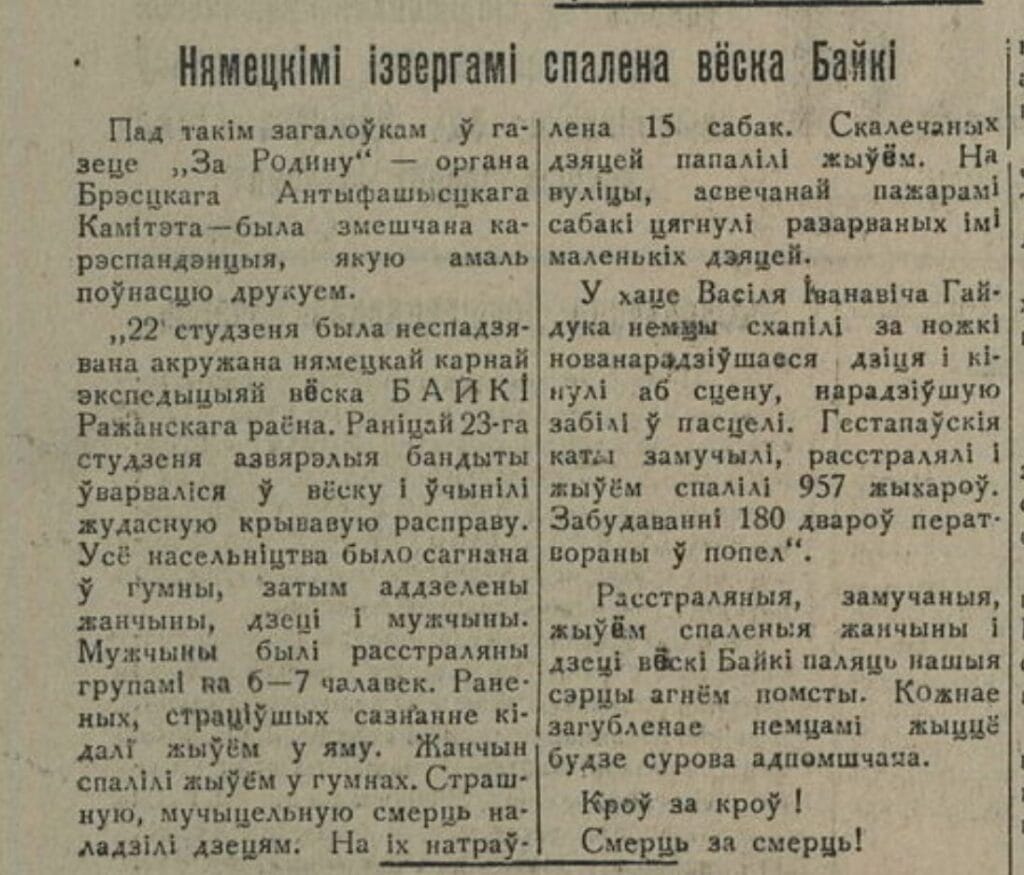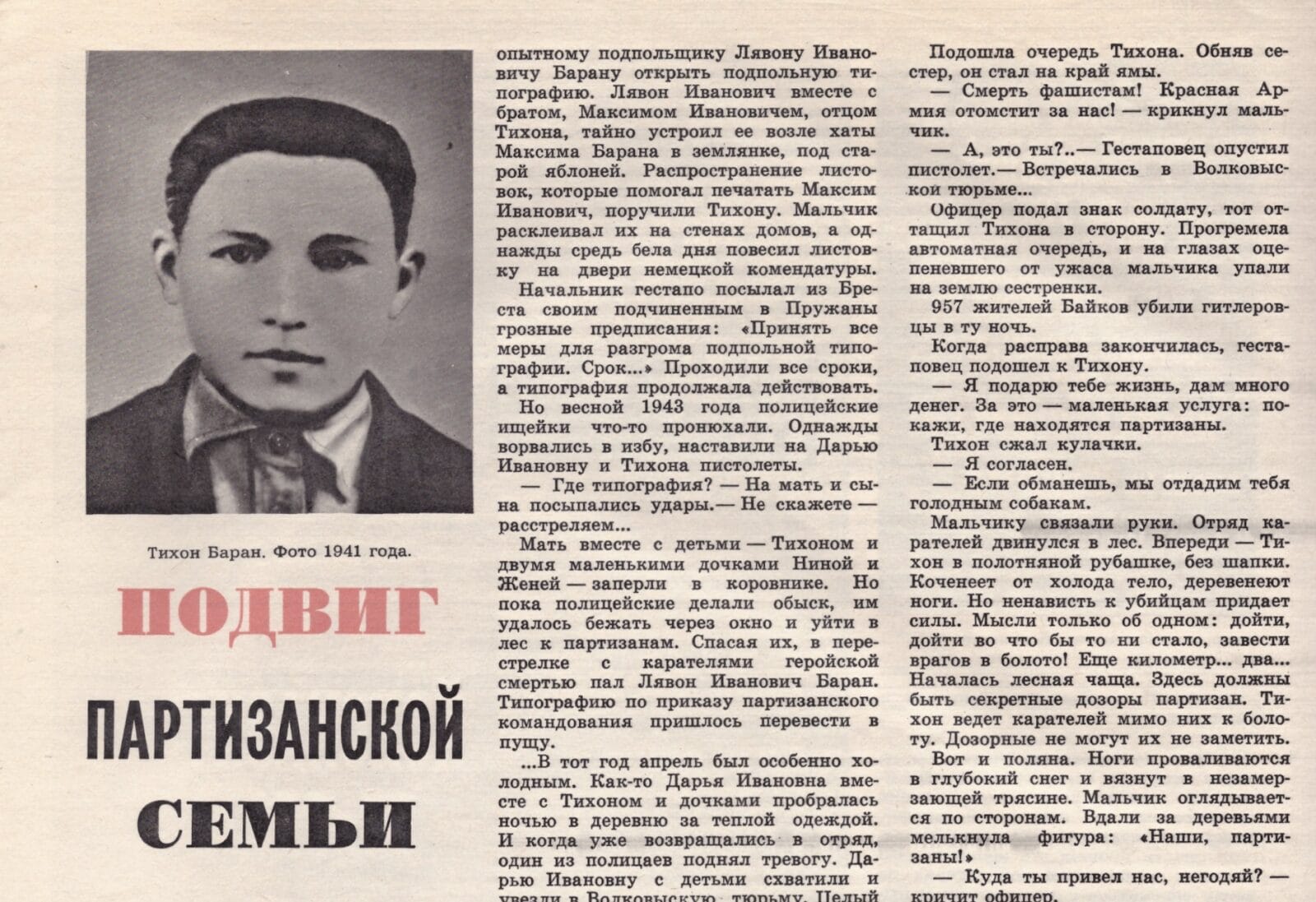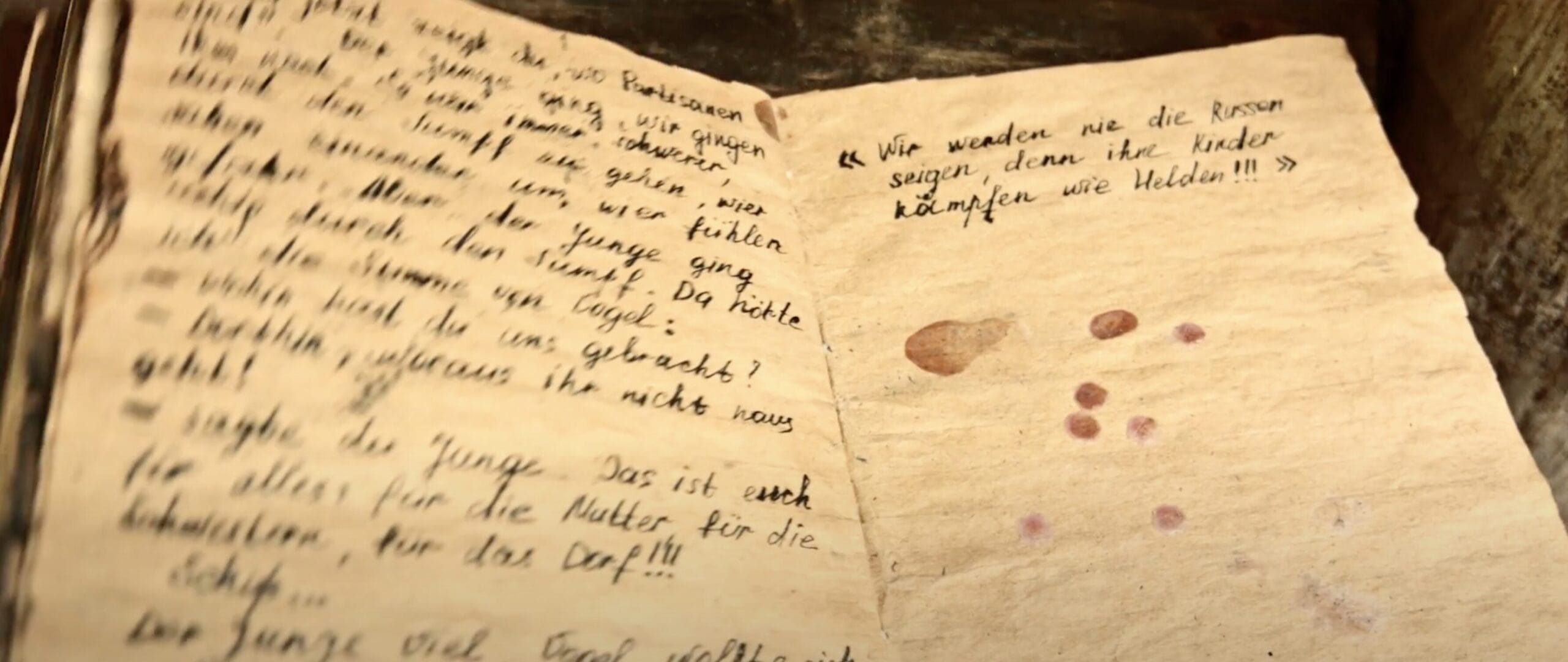This quote is often cited in stories about the exploits of the pioneer hero Tikhon Baran. We checked its accuracy.
In Russian-language social networks and the media you can often find publications about the pioneer Tikhon Baran, who in 1944 repeated the feat of Ivan Susanin. The punishers who destroyed his village left the boy alive so that he could show them the way to a partisan detachment hiding in the forests. However, instead he led them into a swamp in the forest. Realizing the deception, one of the Nazis shot the pioneer, but it was too late - the soldiers got lost and then died. Some publications claim that the feat of Tikhon Baran became known from the words of the only surviving soldier of this detachment, who was captured. In his diary, the partisans allegedly read the phrase “We will never defeat the Russians, because their children fight like heroes.” According to another version, not only this phrase, but the whole story was recorded in the diary, and it was found after the war - and only then did they learn about Baran’s feat. Similar publications can be found in Media, Facebook, "VKontakte", blogs, on YouTube, on sites libraries, museums And universities.
During the Great Patriotic War, children often took part in hostilities - in partisan detachments, underground anti-fascist cells, and also as “children of the regiment.” Many of these children were awarded orders and medals (six were even awarded the title Hero of the Soviet Union).
One of these young partisans was Tikhon Baran, a boy from the Belarusian village of Bayki. According to the article “Family of Patriots”, published in the local history collection “Memory: historical-dakumuntal chronicle of the Pruzhany district"(Minsk, 1990), his entire family collaborated with the anti-fascist committee to combat the occupiers. In a secret dugout next to their house, an underground printing press operated since 1942. In the summer of 1943, arrests began in Bayki. Tikhon, his mother and younger sisters were also arrested (his father and older brother managed to go to the partisans). The children were later released back to the village, and the mother was sent to a concentration camp (she survived her imprisonment and returned to Bajki after the war).
In the winter of 1944, when the liberation of Belarus was already underway, German troops almost completely destroyed the village. How this happened can be judged from the memo that the Brest Anti-Fascist Committee sent to the secretary of the Brest underground regional committee of the CP(b)B Sergei Sikorsky on February 29, 1944. It said: “When the village of Baiki was burned and 957 Soviet citizens were burned alive, we present the following facts of the atrocities of the German monsters. By the morning of January 23, brutal bandits burst into the village and committed a monstrous massacre. The entire population was herded into barns, then separately women, children and men. The men were shot in groups of six or seven; the wounded and those who lost consciousness were thrown alive into a pit. The women were burned in barns. They gave the children a terrible, painful death. 15 dogs were set on them. The crippled children were set on fire. On the street, illuminated by the fire, dogs dragged small children torn to pieces by them" (quote from the book "The tragedy of Belarusian villages, 1941–1944", Minsk-Moscow, 2011). The memories of several eyewitnesses of the tragedy have survived to this day - first of all Stepana Shabuni and his son Nicholaswho managed to escape. At first, when the villagers were being led to be shot, they hid in the hay, and then, when the houses and barns were set on fire, they fled to the gardens. Memories of Tikhon Baran’s father have also been preserved - Maxim Ivanovich, who at that time was in the partisan detachment.

The name Tikhon Baran does not appear in these memoirs. “Verified” was unable to establish exactly when and under what circumstances the boy’s feat became known. In the biographical information prepared by the Brest Regional Library, approvedthat already in 1954 he was included in the Book of Honor of the pioneer organization. However, then only approved, and to include in it “the names of the best of the best pioneers, whose exploits and deeds serve as an unfading example for all pioneers and schoolchildren of the Soviet Union” started only a year later. In any case, his name became known to the broad masses only in the late 1960s - early 1970s, when Galina Vasilevskaya’s story “Drawing in the snow" It was this work of art that became the main source of information about the fate of Tikhon Baran for modern publications. Vasilevskaya just mentions the diary of a captured German. However, she speaks of this story as an oral tradition:
“What about Tikhon? The boy returned to his mother from legend. They say that only one German from that punitive detachment managed to escape. He wandered through the forest for a long time. He was caught by the partisans. In the diary of a German soldier they read the following words: “We will never defeat the Russians, because even their children fight and die like heroes.” That German told the partisans about a boy from the village of Bayki, a little partisan scout Tikhon Baran, who had never heard of Ivan Susanin... And he repeated his feat.”

Published on the website “Belarusian villages burned during the Great Patriotic War” dated January 18, 1949 interrogation protocol German prisoner of war Wilhelm Schulte. He named the names of several of his colleagues in the Caesar detachment, which carried out a punitive operation in the village of Bayki (he denied his own participation in it). The protocol of another interrogation of Schulte was published in the book "The tragedy of Belarusian villages, 1941–1944" None of them mention any diaries - neither of Schulte himself, nor of any of his colleagues. There is no mention of the diary in the already mentioned collection “Memory", neither in the article "The feat of the partisan family" ("Peasant Woman", No. 5 for 1971), nor in the collection of essays "Pioneer heroes"(Minsk, 1985). Belarusian State Museum of the History of the Great Patriotic War in response to a request from “Verified”, he replied that they kept a letter written in 1962 to the then director of the museum S.R. Shchutsky by Tikhon’s father. This letter sets out in detail the history of Tikhon’s feat, but the German soldier’s diary is not mentioned there either.
The diary begins to appear regularly in publications about Tikhon Baran only in the 2010s. Especially many publications appeared after 2015, when there was plans announced make a feature film about a pioneer hero (in the end everything was limited teaser). The plot of the planned film was built around the diary of a German soldier. At the same time, the director of the film, Irina Brel, clarified that she knows nothing about the real existence of this document. “To confirm many facts about the feat of the Belarusian boy, we only need the diary of an unknown German soldier. It contained the phrase: “We will never defeat this people, because their children fight like heroes,” which carries great meaning. We believe that the diary will be found. Many resources have been connected to search for him, including a request to Germany,” spoke she is in one of the interviews.
At the same time, it is logical to assume that the diary of a prisoner of war would hardly have ended up in Germany. Most likely, he, like other similar documents would be stored in one of the archives of Russia or Belarus - if not the original, then at least a typewritten copy. Some online publications talking about the diary, refer to an article in the magazine “Family and School” in 1980. However, the archive of this magazine available online, and in none of the issues for 1980, “Verified” did not find an article about Tikhon Baran.
Thus, the source of the quote allegedly found in the diary of a German soldier is a work of fiction whose author refers to oral tradition. None of the available documents about the tragedy in the village of Baiki mention any diaries, as well as in publications about Tikhon Baran until the 2000s.
Cover photo: still from the teaser for the film Helden
Read on topic:
- Did Bismarck say: “The Russians cannot be defeated. But they can be instilled with false values, and then they will defeat themselves”?
- Did Churchill say that Russia is never as strong or as weak as it seems?
- Is it true that Hitler gathered a significant part of European countries to fight against the Soviet Union?
If you find a spelling or grammatical error, please let us know by highlighting the error text and clicking Ctrl+Enter.






